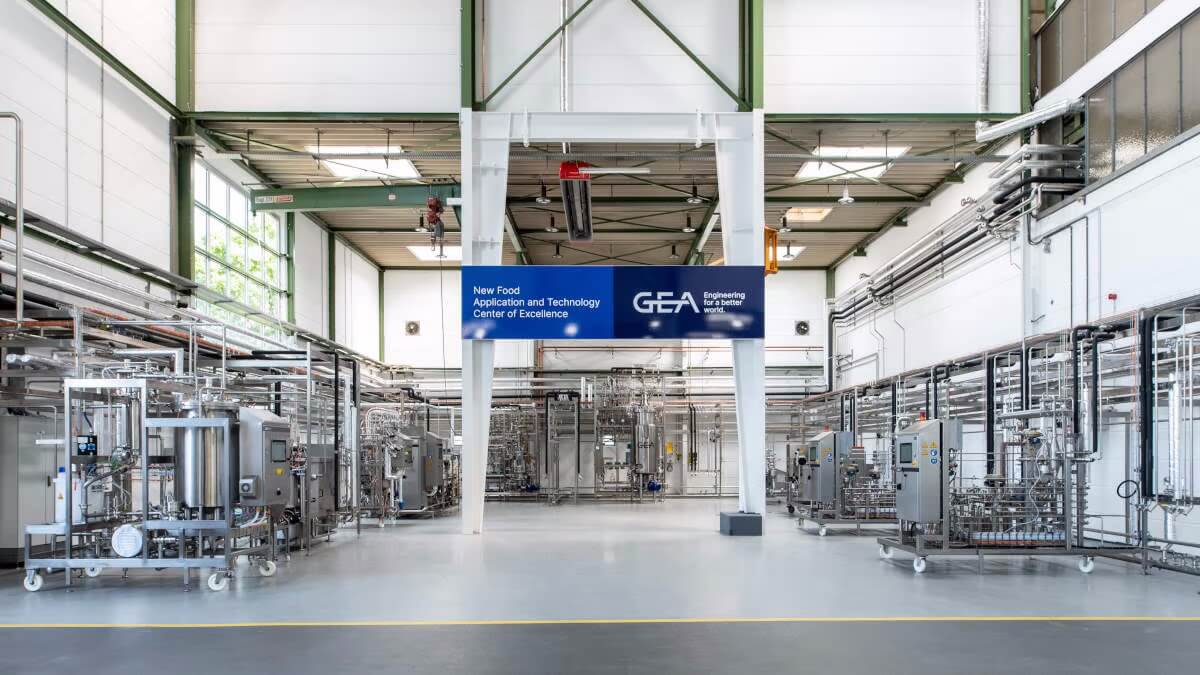A state-of-the-art technology centre in Wisconsin, USA, will be home to an end-to-end process line developing alternative proteins in response to demand from the booming ‘new food’ industry.
By Joanne McIntyre, Stainless Steel World
GEA has invested EUR 18 million in a technology centre for alternative proteins in the USA. The new food innovation centre on the GEA Campus in Janesville, USA, will evaluate processes for producing new food on a transferable pilot scale and test production using cell cultures and microbial fermentation in conjunction with upstream and downstream process steps. The 10,000 m2 facility will be housed in an extension of the existing GEA building.
The technology centre will develop sustainable meat, dairy, seafood and egg alternatives. There is significant demand for the technology in the fast-growing US ‘new food’ market. The new food tech hub will pilot microbial, cell-based and plant-based foods. GEA’s state-of-the-art technologies and a team of biotechnology experts form the basis for scaling new food for industrial production. The new campus is scheduled to open in the spring of 2025.
Technology boost for new food
The USA is one of the countries promoting the development of sustainable food options through favourable regulation and openness to innovative food technologies. For example, the Food and Drug Administration (FDA) already approved cell-cultivated chicken meat in 2022, and last year confirmed that the use of precision-fermented milk proteins in foods is safe.
“A number of new food pioneers in the USA are already writing innovation history. When it comes to industrial production, the market is still on the starting blocks. GEA’s new food centre bridges a gap in the innovation landscape, driving forward the development of complementary proteins through technology,” says Dr Reimar Gutte, Senior Vice President Liquid and Fermentation Technologies, leading New Food at GEA.
“Most new food companies are located in North America, and the bulk of the investments in alternative proteins flow into this region. Consequently, there is an urgent need for scaling facilities like ours,” says Arpad Csay, who leads GEA’s North American new food business. “The GEA platform in Janesville will enable manufacturers to conduct their scaling and testing work without investing in their own capital-intensive infrastructure. In this way, we will help overcome scaling challenges and accelerate the industry’s growth.”
Biologization of the food industry
Beyond testing and validating processes, GEA also intends to promote the training of biotechnology specialists in the 10,000 m2 building. Attached to the GEA site for homogenizers, separators, pumps and valves, which opened in December 2023, the new food experts will enhance knowledge sharing with other disciplines.
This project marks GEA’s second investment in a new food hub, which fast-tracks innovations from the lab to commercial-scale manufacturing. Prior to this, GEA inaugurated its technology center focusing on cell cultivation and fermentation in Hildesheim, Germany, in June 2023.
New food: growth driver for industry
The novel food movement addresses the challenges posed by the megatrends of climate change, food security and ethics, and healthy nutrition. That is why new food has been identified as one of the growth drivers in the GEA Mission 26 strategy.
One dedicated business line is working on technologies and full production lines for microbial proteins or proteins cultivated in bioreactors, plant- or fungi-based foods, as well as innovative hybrids combining plant-based products with proteins produced using biotechnology.
End-to-end process line
GEA’s new food technology centre will be home to an end-to-end process line. It includes GEA’s multifunctional fermenters or bioreactors together with high-shear mixing, sterilization, homogenization, cell separation and filtration equipment. The system can freely alter the sequence of the various steps and add or repeat process stages to test cultivation and fermentation strategies along with product synthesis. At the ATC, GEA helps the industry accelerate process development for a wide range of new food applications. The innovation centre complements GEA’s new food centres of excellence: the full pilot line in Hildesheim (Germany) and the technology centre for bioreactors (Skanderborg, Denmark), cell separation (Oelde, Germany) and plant-based foods (Bakel, Netherlands).
Stainless essential for food industry
In February 2024, GEA announced it would use its first consignment of “green stainless steel” in the production of its machinery and equipment. The stainless steel coil was delivered to the GEA production site in Bönen (Germany) by Klöckner & Co’s German subsidiary Becker Stainless. For example, in a pilot project, the material is being used to make milking technology more sustainable. Stainless steel is an irreplaceable material in the food industry, where it offers unparalleled utility and hygienic properties. The durability, corrosion resistance, and ease of cleaning mean stainless steel is used from industrial kitchens to artisanal bakeries.
About this Tech Article
This tech article appeared in Stainless Steel World, June 2024 magazine. To read many more articles like these on an (almost) monthly basis, subscribe to our magazine (available in print and digital format) – SUBSCRIPTIONS TO OUR DIGITAL VERSION ARE NOW FREE.
Every week we share a new Featured Story with our Stainless Steel community. Join us and let’s share your Featured Story on Stainless Steel World online and in print.



